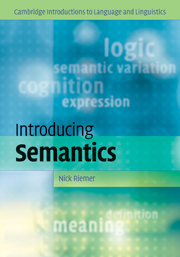Book contents
- Frontmatter
- Contents
- Note to the reader
- 1 Meaning in the empirical study of language
- 2 Meaning and definition
- 3 The scope of meaning I: external context
- 4 The scope of meaning II: interpersonal context
- 5 Analysing and distinguishing meanings
- 6 Logic as a representation of meaning
- 7 Meaning and cognition I: categorization and cognitive semantics
- 8 Meaning and cognition II: formalizing and simulating conceptual representations
- 9 Meaning and morphosyntax I: the semantics of grammatical categories
- 10 Meaning and morphosyntax II: verb meaning and argument structure
- 11 Semantic variation and change
- Glossary
- References
- Index
1 - Meaning in the empirical study of language
Published online by Cambridge University Press: 05 June 2012
- Frontmatter
- Contents
- Note to the reader
- 1 Meaning in the empirical study of language
- 2 Meaning and definition
- 3 The scope of meaning I: external context
- 4 The scope of meaning II: interpersonal context
- 5 Analysing and distinguishing meanings
- 6 Logic as a representation of meaning
- 7 Meaning and cognition I: categorization and cognitive semantics
- 8 Meaning and cognition II: formalizing and simulating conceptual representations
- 9 Meaning and morphosyntax I: the semantics of grammatical categories
- 10 Meaning and morphosyntax II: verb meaning and argument structure
- 11 Semantic variation and change
- Glossary
- References
- Index
Summary
CHAPTER PREVIEW
in this chapter we will introduce some important concepts for the study of semantics. In 1.1 we place the notion of linguistic meaning in the wider context of human communication and behaviour. Section 1.2 then examines some of the vocabulary that English and other languages use for ordinary talk about meaning in language and related phenomena. A consideration of how this everyday non-technical vocabulary varies cross-linguistically can show some of the important different aspects of linguistic meaning. In section 1.3 the semiotic triangle of mind, world and language is discussed, followed in 1.4 by an introduction to five fundamental concepts:
lexemes;
sense and reference;
denotation and connotation;
compositionality; and
levels of meaning.
Next (1.5), we introduce the concepts of object language and metalanguage, and distinguish a number of different possible relations between the language in which meanings are described (the ‘metalanguage’) and the language whose meanings are described (the ‘object language’). We will then consider three different identifications of meaning: meanings as objects in the world (referents: 1.6.1), as objects in the mind (concepts: 1.6.2), and as brain states (1.6.3). An alternative identification is the notion of meanings as uses, discussed in 1.6.4. To end the chapter, we consider a view of meaning on which meanings are unobservable, hypothetical constructs posited to explain facts about language use (1.7).
What is semantics?
Any attempt to understand the nature of language must try to describe and explain the ways in which linguistic expressions have meaning. This book introduces some of the aspects of meaning studied in linguistic semantics, the branch of linguistics which, along with pragmatics, has responsibility for this task.
- Type
- Chapter
- Information
- Introducing Semantics , pp. 1 - 44Publisher: Cambridge University PressPrint publication year: 2010



